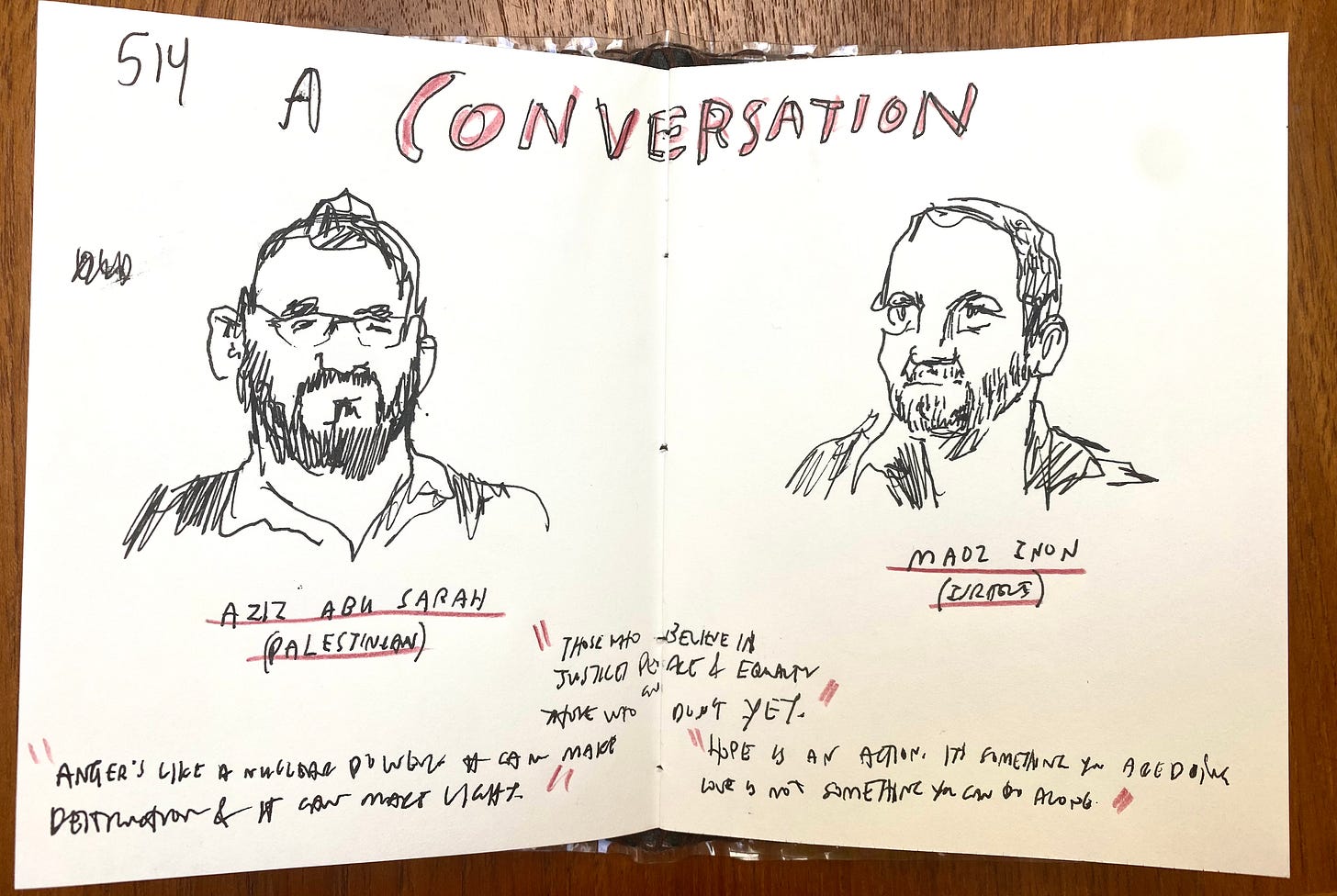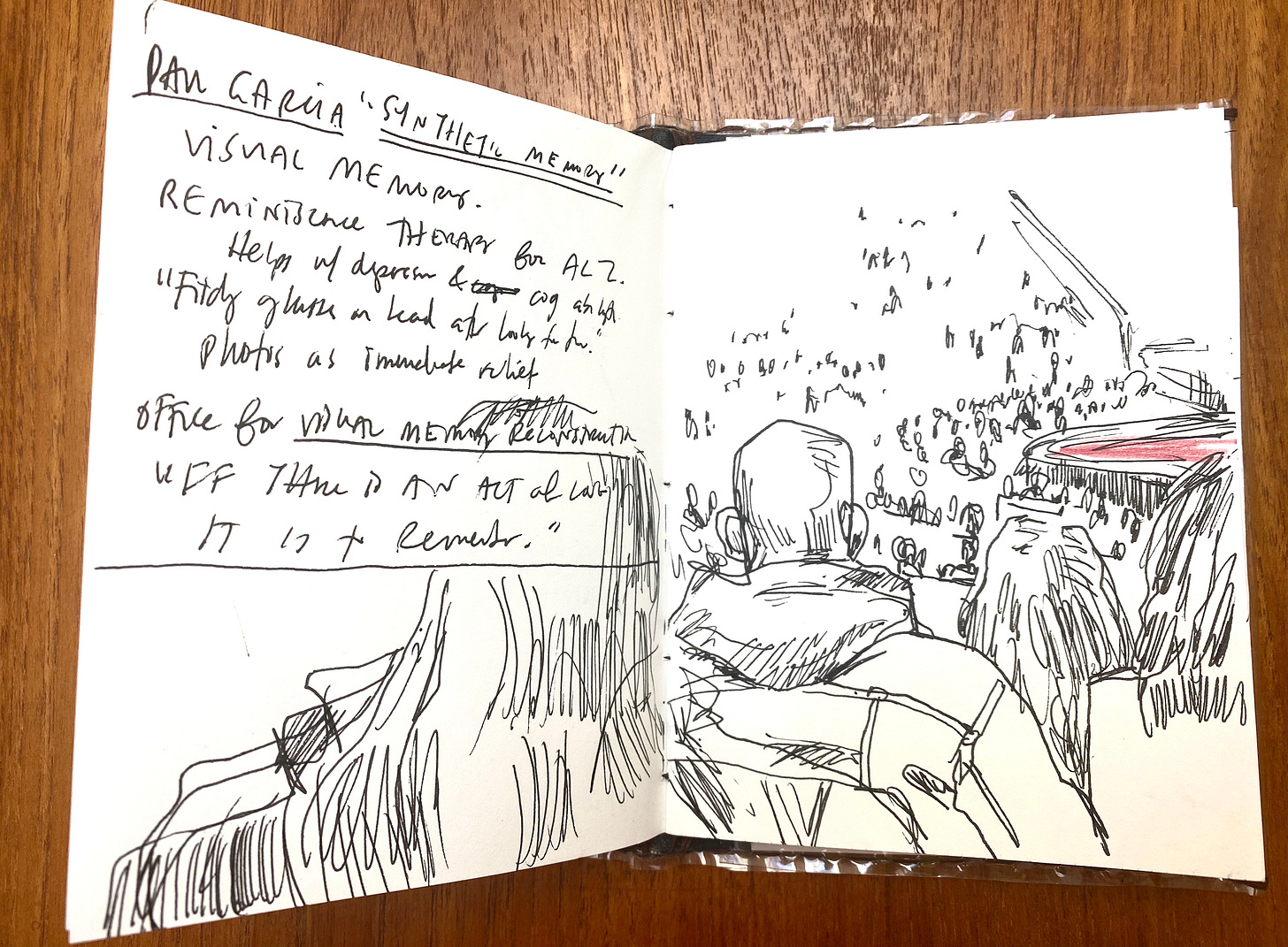Hey GUT PEEPS!
Loved everyone’s anti-perfectionist drawings last week. The comments in the post and the chat were so relatable and supportive. Seems we all grapple with the pressure of expectation. There’s a fantastic selection of GUTsters drawing at the end of this dispatch proving that if we keep drawing, we slowly let go of that pressure, and find ourselves delighted by unexpected outcomes. This simple assignment is a great way to let go of “getting things right.”
Now onto this week.
REPORTING FROM TED
So I went to TED last week.
It’s rare air over there. Tickets start at 10K a pop, and I hear there’s some kind of application process, making it all but impossible to get in. (Thank you to my generous friend for hosting me. You know who you are. ❤️ I am very lucky!)
Thankfully, many of the talks end up going online, so we all get to see them eventually. But being at TED is about more than the talks. It’s about the talking that happens outside the talks. Pretty much everyone there is an engaged, creative, ambitious person. You can’t help but meet interesting people while standing in line for lunch.
“Beware of artists. They mix with all classes of society and are therefore most dangerous."— Queen Victoria
One of the best things about being a working artist is having access to different worlds. TED is a great example of a place where artists, scientists and business people get to mix.
I have challenging, mixed feelings about the whole thing. It’s complicated. Like life. And this was also a working trip for me: I talked people’s ears off about DrawTogether and the importance of baking drawing and art into our educational system from the jump and the impact of drawing on our health and wellbeing throughout life. (A stark rebuttal to the zealousness around AI, a topic that was the subject of many talks and mentioned over 300 times on stage!)
In any case, I’m glad I went, and feel very, very lucky that I got to be there.
This week, I thought I’d share a little of what I heard at TED with y’all, my GUT peeps. This is my attempt to re-distribute the wealth.
This is by no means a comprehensive overview of all the talks - there were more than 50 by my count. But what follows are some highlights and quotes and take aways from the talks that struck me, and some notes and doodles I did while watching. At the end of the dispatch I’ll share with you my main questions/challenges I walked away with, and give you all a related drawing assignment.
Ready? Vicarious TED. Here we go:
TED 2024: An overview
The conference started with a powerful conversation between Aziz Abu Sarah and Maoz Inon, Palestinian and Israeli peacemakers and citizens who have both lost way too many loved ones in the war in Gaza. A few quotes that I wrote down from their tempered, restrained and open-hearted session:
“Anger is like a nuclear power: it can create destruction, and it can create light.”
“There are two types of people: those who believe in justice, peace and equity and those who don’t… Yet.”
“Hope is an action. It’s something you are do. And love is something you cannot do alone.”
Looks like this talk is online already! You can watch their conversation here.
Kristine McDivitt Tompkins shared her work protecting the biodiversity in 15 national parks in Argentina and Chile. She and her late husband Doug Tompkins, helped protect nearly 14.8 MILLION ACRES of parkland (!)
“If your life’s work can be accomplished in your lifetime, you’re not thinking big enough.”
Fei-Fei Li is a computer scientist at Stanford and founding direction of the Stanford Instate for Human-Centered AI. She started off her TED Talk on AI and spacial intelligence explaining how sight works, so you know my ears pricked up. She gave an overview on the evolution of sight, starting with creatures deep deep down in the dark, lightless waters, when there was no need for eyes. Then, 538.8 million years ago, they emerged from the water and onto land and developed vision. This period is known as the Cambrian Explosion, and some scientists believe that it was sight that led to an interaction of special, and an explosion of evolution. As Fei-Fei put it,
“Sight led to insight.”
and
“Seeing is for Doing.”
The rest of Fei-Fei’s talk was about robots gaining spacial intelligence and to be honest I found it depressing and terrifying. How about we teach people to see one another first??

Avi Loeb is the head of Harvard’s Galileo Project and founding director of the Back Hole Initiative. He is searching for life in the universe. And he is just lovely. While I will continue to bang my drum about putting our resources and efforts towards improving the health and wellbeing of people on earth before we fly off to mars, his argument about the impact of awe on our lives has me convinced. He said,
“If we discover something, we might regain a sense of humility. A sense of awe.”
Can’t argue with that. (Netflix is currently making a documentary about Loeb’s work. I can’t wait.)
Malaria causes 600,000 deaths a year in Africa. (Fun fact: I got it in 2000 when I was working in Rwanda. It was TERRIBLE.) Diabate Abdoulate has an innovative, promising approach to eradicating it that uses the mosquitos themselves. A great quote from his talk:
“If you think you’re too small to make a difference, you’ve never spent a night with a mosquito in the room.”
Designer Pau Garcia shared a project where he creates “synthetic memories” using data to create visual memories for people. Imagine a person with Alzheimers forgetting their childhood home, and there are no images of it available. Garcia’s project creates a visual image that could help fill in that blank. He says:
“If there is an act of love, it is to remember.”
My question: Sounds lovely, and I’m sure there are some instances where this is really helpful. At the same time, as we age, are we really supposed to remember everything? And how important is it to stay in the present with the people we love instead of trying to get them to relive the past? Another way of saying that: when we recreate memories for people, whose suffering are we really alleviating? Theirs or ours?
Julie and John Gottmans are couples therapists. They have been researching couples conflicts for over 50 years.
Their research finds that fighting is good for relationships. What matters is HOW people fight. That “fighting to understand vs. fighting to win” determines not only the outcome of the fight, but also the outcome of the relationship.
Also, when contempt starts to show up in our fighting, it can have a huge negative impact on our immune system, with people living something like four years less. Other negative fighting styles include criticism, paying innocent, and stonewalling. Positive fighting includes using “I” statements, as in “I am feeling X, and I need Y. Would you like to join me in that?”
Imagine if world leaders took this approach.
Mark Grimmer cofounded the design studio 59 productions that creates immersive digital experiences, like David Bowie’s career retrospective and the history of Apollo 11 for the Smithsonian. I don’t have a quote from him, but he spent three months with the one and only David Hockney, poking through his archive and interviewing him to create the digital experience “Bigger & Closer” that puts you INSIDE Hockney’s artwork and in conversation with the artist. Mark is also the sweetest and I hope we all get to see this amazing work if/when it comes to a place near us. Fingers crossed.
There were SO MANY more fascinating talks and performances and I’m sure they’ll find their way into future GUT dispatches. But that’s what I’ve got for you now. I’ll finish with some of the challenges and questions I’m still pondering a few days out:
What if humans invested their brilliant brains and resources towards making people healthier and happier? And by that I mean deepening human relationships, reducing suffering and increasing love and joy in all people, instead of trying to live forever with fake robot friends.
How can people with power argue for what’s best for other people but have little to no interaction with the people they are talking about? Case in point: there was a lot of discussion on stage around gender (an entire talk devoted to testosterone and gender-essentialism) but there were no gender non-conforming speakers. None.
Why are people investing in more art-making AI robots INSTEAD OF PEOPLE MAKING MORE ART? Why are tech people putting all these resources towards inventing ROBOTS TO DANCE WITH PEOPLE (yes, dancing robots was an actual talk) instead of creating programs for people to dance with one another? We know that human-centered arts programs enhances health, wellbeing and quality of life from the inside out. Why aren’t the arts the focus of investment and innovation??
Welp, those are my questions.
I know this is different from our usual dispatch, but I thought y’all would appreciate the peek behind the red curtain with me this week.
Our assignment is based on a few of my favorite TED talks. That’s below, along with a curated selection of your phenomenal drawings from our assignment last week.
And with that, Thank you for coming to my TED talk.
Assignment: TEDxGUT
This week’s assignment:
Keep reading with a 7-day free trial
Subscribe to DrawTogether with WendyMac to keep reading this post and get 7 days of free access to the full post archives.






